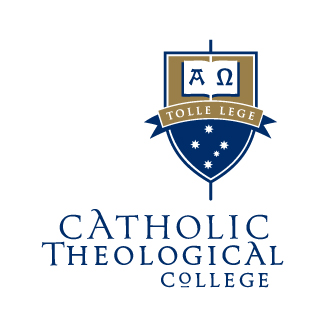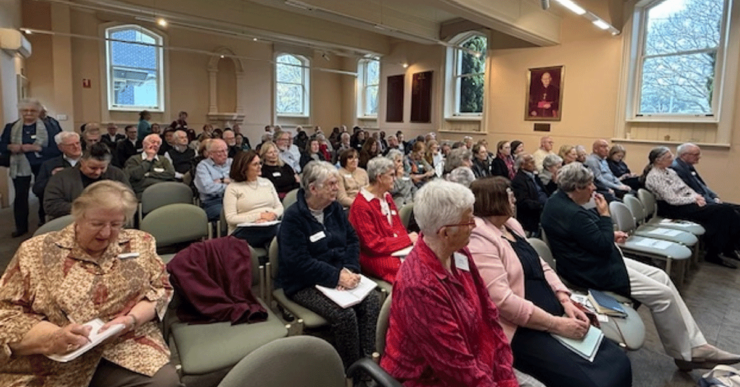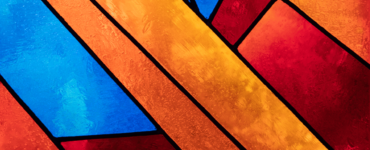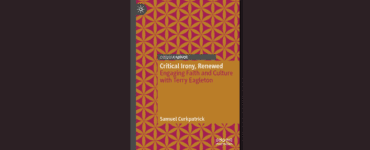This article is republished with permission from Melbourne Catholic.
A symposium ahead of the 60th anniversary of the close of the Second Vatican Council brought together Australian theologians and church leaders at Catholic Theological College (CTC) to assess the council’s legacy and relevance to today’s Catholic Church. The broad consensus of the discussions at the symposium, co-hosted by CTC and Yarra Theological Union, was that Vatican II is still unfolding, and it is yet to reveal what will clearly be a very different Church in the future.
‘Vatican II began under the glare of the Cuban Missile Crisis and the great ideological divide symbolised by the Berlin Wall and the Cold War,’ said symposium organiser Rev Dr Max Vodola. ‘It is no surprise to state that we [too] are living in a broken, fragile and uncertain time.’
Referring to the council’s pivotal document Gaudium et spes (Joy and Hope), he told delegates the joys, griefs and anxieties shared by the followers of Christ then are still shared today, ‘because Vatican II helped us to be attentive to “the signs of the times”’.
The Catholic Church of today cannot simply repeat the words of the Second Vatican Council … as if nothing had changed in the last 60 years.
Prominent Church historian Prof Massimo Faggioli, in a keynote delivered via Zoom from Dublin, argued that the Church is in a new phase of the council’s reception. He said that the Church can have no future that leaves Vatican II behind, yet ‘the Catholic Church of today cannot simply repeat the words of the Second Vatican Council, of those documents, as if nothing had changed in the last 60 years.’
Prof Faggioli pointed to issues of gender equality, racism and colonialism that the council could only address in a minimal way in the 1960s. He identified Pope Francis as a pivotal figure, ushering in a globalised reading of the Second Vatican Council—‘global, meaning something that is not controlled by … European theology anymore’.
This global vision was a central thread, particularly in the form of ‘synodality’, the term that has become synonymous with the Francis-led revival of Vatican II. It was hardly mentioned at Vatican II, said Dr Vodola, ‘and yet, I would call it the “first cousin” of collegiality, which became one of the great buzz words and ideas of the post-conciliar period. Through synodality, Francis simply helped the Church recover the ancient practice and mindset of the post-apostolic period.’
The challenge, he said, is to properly value the human processes—‘as Pope Francis’ synthesis of Vatican II says in his notion of synodality, to keep in balance the human element and the divine element in both the whole people of God and the hierarchy within it.’
The lived experience of people is part of the liturgical celebration they participate in.
Prof Susan Pascoe illustrated this shift towards a more participatory Church by contrasting images of past Synods of Bishops, where lay people were relegated to the back, with the circular, dialogical model used in the recent Synod on Synodality. She quoted its final report: ‘Each member of the community must be respected … with value placed on their gifts and abilities in light of the goal of shared decision-making.’
The fundamental shift in the council’s liturgical vision also continues to reverberate, according to two presenters. Dr Gavin Brown traced the move from a pre-conciliar ‘narrow’ liturgy as a clerical preserve, to what he called the ‘stunning re-imagination’ within the council’s Constitution on the Sacred Liturgy, which transformed the Eucharist from a spectacle to a communal exercise.
Liturgist Fiona Dyball emphasised that ‘liturgy, prayer and spirituality are all needed’ in Catholic life. She pointed to Pope Francis’ Apostolic letter Desiderio desideravi as a continuation of this work, focusing on formation that recognises people’s lived experience as ‘part of the liturgical celebration they participate in’.
Dr Cornish traced this development through the social teaching of Popes John Paul II and Benedict XVI to Pope Francis’ Laudato si’. ‘The ecological crisis is not simply a material crisis of sustainability,’ she said. ‘It is a spiritual crisis.’ She explained that Francis’ vision of integral ecology calls for a ‘renewed Christian anthropology, in which our understanding of what it is to be human is much humbler and more connected with the rest of creation’.
We will continue to see some kind of battle for meaning around Vatican II, which is the scene, the source of all other debates within the Church.
Prof Mary Coloe provided a critical historical perspective, tracing the foundations of the council’s scriptural renewal to the often-overlooked encyclicals of Pope Leo XIII. She argued that without his pivotal 1893 document Providentissimus Deus, ‘we would not have these documents’ of Vatican II. She detailed how Leo XIII initiated a revolution in Catholic theology by insisting that Catholic scholars return to the original source texts of Scripture.
This rigour is fading, Prof Coloe warned, particularly in biblical scholarship in Australia. Referring to an ageing cohort of priests and theologians, she stressed the urgent need to highlight Scripture in theological education ‘before time runs out’. It was a stark reminder that Vatican II’s return to the Word of God is not self-sustaining and depends on a continuing investment in scholarly formation.
Prof Faggioli described the current state of the Church as full of ecclesial tensions, where the legacy of Vatican II remains a central point of contention. ‘The Catholic Church has become a big battlefield of ideas, of political cultures, of ideologies,’ he said. ‘We should do everything possible to keep that a peaceful kind of battle … but we will continue to see some kind of battle for meaning around Vatican II, which is the scene, the source of all other debates within the Church.’
The symposium showed that the windows opened 60 years ago are still wide open, letting in fresh air for a Church that is still figuring out how to walk together, make sense of the Gospel in today’s world and confront the pressing signs of the times.
Photos by Melbourne Catholic.

Catholic Theological College is a college of the University of Divinity from the Catholic tradition, based in Melbourne, Victoria.







Add comment